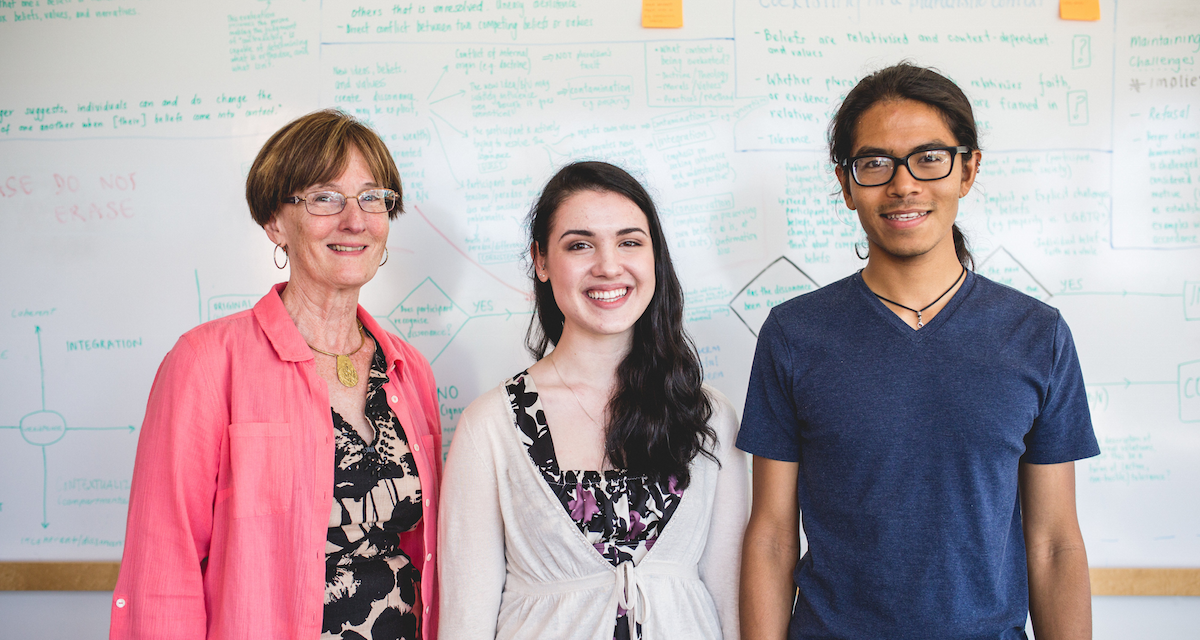From Brazil to China: How Culture Impacts Faith
This summer, several student-faculty teams are tackling research projects in the arts and sciences—from asthma to accounting audits, bilingualism and women in leadership. Some are funded through the Provost’s Summer Research Fellowships, and others are individual projects. Throughout the next few weeks, we’ll cover the teams’ progress as they seek to answer complex questions in their fields.
Continuing a yearlong project, Dr. Kaye Cook (psychology) and research assistants Taylor-Marie Funchion ’18 and Si-Hua Chang ’16 are studying Evangelicalism and Modernizing Cultures: Brazil and China.
The team has conducted interviews with Brazilian and Chinese people both in the local Boston area and in Brazil and China, examining values in different cultural contexts to understand “what believers do when beliefs come in conflict,” Dr. Cook explains. “We spent the first part of the summer coding these interviews.”
Together, they’ve written a chapter for an upcoming book and will host a conference in late July to “bring 12 pastors and academics from Brazil and China to participate together in a Think Tank about two big themes,” says Dr. Cook.
“First, how do pluralism and modernity influence evangelicalism? And second, do evangelicals in Brazil and China emphasize the vertical over the horizontal in the same way that American evangelicals do?”
Dr. Cook explains that the “vertical” refers to the process of developing Christian maturity—a topic that’s often focused on the individual’s relationship with God, Taylor-Marie adds.
In contrast, the “horizontal” is about community—developing the Christian life in a wider context. “Broad engagement transforms us,” says Dr. Cook. “It boils down to love of God and love of neighbor—the hard part is getting the balance right.”
The research team is studying country-specific issues, but is also examining “the universal issues of consumerism and lack of commitment.”
The goal is that, through relationships between Gordon and Brazilian and Chinese leaders, there would be synergy to encourage deeper growth—perhaps through joint publications, Gordon faculty teaching a class at seminaries in those countries, or helping Think-Tank participants to plan conferences for laypeople in their home churches.
“It was exciting to be offered a full summer of research,” says Taylor-Marie, a psychology major. She’s trying to get as much research experience as she can fit in before applying to grad school to study clinical psychology.
For Si-Hua, a psychology and philosophy double major, specific themes within the project, “such as the values and morals and the frameworks we’re looking at” appeal to his interests. He’s also enjoyed the collaborative work. While trying to draw themes from the interview transcripts, “we had different opinions, but it worked really well,” he says.
Together, the team is remarkably strong for undergraduate researchers. “The next thing we’re going to do is high-level statistical analysis for another project,” Dr. Cook says. “It’s been intense this summer, but all three of us are enjoying it, I think—and we aren’t likely to run out of things to do.”
“I think Dr. Cook always has some offshoot of the current project up her sleeve,” says Taylor-Marie.
“Very true,” Dr. Cook laughs.
Read about Dr. Angie Cornwell (biology) and Courtney Olbrich ’19 >>
Read about Dr. Jonathan Gerber (psychology) and Hannah Reimel ’17 >>
Read about Dr. Karl-Dieter Crisman (math), Min-Sun Kim ’17 and Luke Cui ’18 >>
Read about Dr. Melinda Eichhorn (education) and Courtney Vitale ’18 >>
By Morgan Clayton ’19, history
 The Bell
The Bell